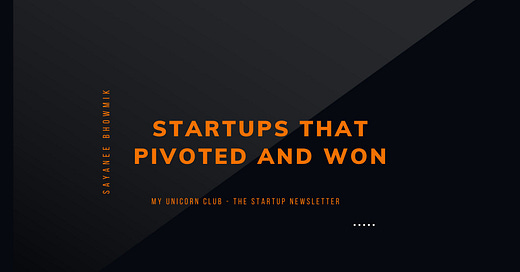Hey founders,
Welcome to another edition of My Unicorn Club - The Startup Newsletter - It’s a biweekly FREE newsletter written by those on this side of the table (VCs & Investors) for those on that side (Founders & Startup Enthusiasts).
Let's talk about something that keeps me up at night as an investor: The Pivot
That moment when you realize your brilliant original idea isn't working, and you face the existential choice to adapt or die.
I've seen countless founders cling to failing concepts like they're sacred texts. But here's the uncomfortable truth: the most successful companies in our portfolios weren't the ones who stubbornly stayed the course—they were the ones who dared to change direction when reality demanded it.
Take Slack. Stewart Butterfield wasn't building a workplace communication tool; he was making a video game called Glitch that was tanking. The team pivoted to their internal messaging tool, and now they're worth billions. Or consider Twitter (now X), born from the ashes of a podcasting platform called Odeo that nobody wanted.
What separates winning pivots from desperate failing?
They listen to data, not their egos. Instagram started as Burbn, a check-in app with photo features. Kevin Systrom noticed users ignored most features but loved sharing photos. He didn't take it personally—he recognized opportunity.
When founders get stuck in this phase, I often hop on a 35-minute brainstorming call to help cut through the noise. Sometimes an outside perspective is all you need to see the signals hiding in your data. (My calendar's tight for March, but I've opened a few slots next week.)
They preserve their strengths. Airbnb didn't abandon its community-centric approach when pivoting from air mattresses in apartments to full-home rentals. They understood their core value proposition and amplified it.
They pivot the business model, not just the product. Netflix didn't just switch from DVDs to streaming; they fundamentally changed how they created value by producing original content.
I recently sat down with a founder whose AI analytics tool was bleeding cash. Everyone on their board was pushing them to double down on the original vision. Instead, they noticed enterprise customers were using one obscure feature extensively. They refocused the entire company on that single capability. Six months later, they're profitable.
That's the thing about pivots—they're rarely about radical reinvention. They're about clearing away the noise to focus on what's actually working.
As investors, we're not backing your first idea. We're backing your ability to find the right idea. Your adaptability is more valuable than your initial vision.
And speaking of investors, knowing exactly who to approach saves precious runway. A founder I mentored last month cut her fundraising time in half using my curated database of 150+ investors sorted by sector, check size, and investment philosophy. She could focus on pitching the right people instead of wasting time on research.
So founders, ask yourselves: What signals am I ignoring? What assumptions haven't I tested? What would I do differently if I were starting today with everything I know now?
The best founders I know, review these questions quarterly, not just during crises.
Remember, Shopify was originally a snowboard equipment store. YouTube began as a video dating service. Pinterest started as a mobile shopping app called Tote.
Your first idea is just that—a first attempt. Your willingness to evolve it might be the difference between becoming a case study in business school or just another "almost was" story I tell over drinks.
What pivot have you made recently? Hit reply and let me know—I read every response.
Until next time, signing off
Sayanee Bhowmik





Thanks for sharing Rob!
I am pivoting from self-publishing to waste removal. Going from collaborations to contributions, building upon the needs of my community. The team spirit is here for it!